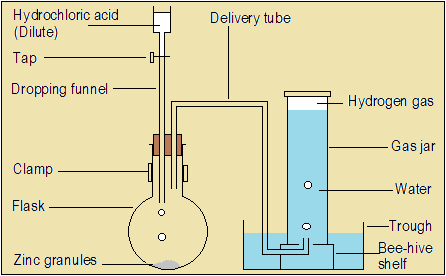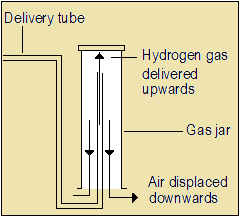CHEMISTRY FORM 1





- 1.1 What is matter?
- 1.2 What is Chemistry?
- 1.3 What does matter consist of?
- 1.4 Are the particles in matter stationary?
- 1.5 Arrangement, distance, and attraction between particles
- 1.6 Properties of matter (volume, shape and compression)
- 1.7 Conductors and non-conductors
- 1.8 Sources of heat
- 1.9 Bunsen burner
- 1.10 Role of Chemistry in society

- 2.1 Pure substances
- 2.2 Mixtures
- 2.3 Separation of Mixtures
- 2.4 Separation of solid-solid mixture
- 2.5 Separation of insoluble solid-liquid mixture
- 2.6 Separation of soluble solid-liquid mixture (solution)
- 2.7 Separation of immiscible liquid-liquid mixture
- 2.8 Separation of miscible liquid-liquid mixtures (solution)
- 2.9 Separation of a liquid-gas mixture
- 2.10 Selecting and using appropriate methods of separating mixtures
- 2.11 Kinetic theory of matter
- 2.12 Classification by physical states
- 2.13 Effect of heat on physical states
- 2.14 Effect of impurities on melting and boiling points
- 2.15 Permanent and non-permanent changes
- 2.16 Definitions, chemical symbols and equations

- 3.1 Simple acid-base indicators
- 3.2 Universal indicators and pH scale
- 3.3 Reactions of acids with metals
- 3.4 Reactions of acids with carbonates and hydrogen-carbonates
- 3.5 Reactions of acids with bases
- 3.6 Effects of acids on substances
- 3.7 Applications of acids and bases

- 4.1 Composition of Air
- 4.2 Fractional distillation of liquid air
- 4.3 Rusting
- 4.4 Oxygen
- 4.5 Burning of substances in air
- 4.6 Atmospheric pollution

- 5.1 Candle wax and water
- 5.2 Reactions of metals with liquid water
- 5.3 Reaction of metals with steam
- 5.4 Preparation of hydrogen gas

Water and Hydrogen: Preparation of hydrogen gas
5.0 Water and Hydrogen 
5.4 Preparation of hydrogen gas
Materials and substances required
- Zinc powder
- Dilute hydrochloric acid
- Conical flask, dropping funnel, delivery tube trough, water, gas jar

Hydrogen and any other gas collected by this method is wet, because it passes through water. Fairly dry hydrogen can be collected by upward
delivery or downward displacement of air; but even this is contaminated with acid spray.
Upward delivery applies to gases like hydrogen which are less dense than air.

Upward delivery (Downward displacement of air)
Questions 5.4(a) 
- There are many metals which react with acids to produce hydrogen gas. Suggest a reason why zinc is a suitable choice for laboratory preparation of hydrogen (Hint: reactivity).
- Hydrogen can be collected over water (by passing it through water) with almost no losses. What does this tell us about the solubility of hydrogen in water?
- What is the effect, if any, of hydrogen on wet litmus paper? (Search Internet).
- What is the appearance (colour) of hydrogen gas?
- How can hydrogen gas be identified?
Answers to Questions 5.4(a) 
Properties of Hydrogen gas
- It is colourless and odourless.
- It is less dense than air (the least dense gas).
- It is insoluble in water.
- It has no effect on wet litmus paper. It is neutral.
- It extinguishes a burning splint with a pop sound.
Burning of hydrogen in air
What is the product of combustion of hydrogen in air?
Materials and substances required
- Zinc granules
- Hydrochloric acid
- Anhydrous calcium chloride, anhydrous copper (II) sulphate
- Beaker, freezing mixture, U-tube, dropping funnel, round bottom flask, match box or gas lighter.

NB: Pure hydrogen burns smoothly. It only pops when wet or mixed with air.
Open the video, burning of hydrogen in air , observe the demonstration, then answer Questions 5.4(b).
Questions 5.4(b) 
- What is the colour of flame with which hydrogen burns in air?
- The liquid collected turns anhydrous copper (II) sulphate from white to blue. Identify the liquid.
- What is the function of anhydrous calcium chloride?
- Write a word equation for the burning of hydrogen in air.
Answers to Questions 5.4(b) 
Pure hydrogen burns smoothly in air with a hot blue flame to produce water.
For interest
Some scientists believe that the huge mass of water in the oceans and seas was produced by the burning of hydrogen in oxygen.
Can hydrogen remove combined oxygen from copper (II) oxide?
Arrangement for the reaction between copper (II) oxide and hydrogen gas is as follows.

The role of anhydrous calcium chloride is to dry the gas, hydrogen.
Open the video, reaction of copper (II) oxide with hydrogen.
Questions 5.4(c) 
- State what is observed when hydrogen is passed over hot copper (II) oxide.
- Why should the unreacted or excess hydrogen gas be burnt?
- Which of the elements, copper and hydrogen is more reactive?
- Write a word equation for the reaction.
- Explain your answer to Question 1.
Answers to Questions 5.4(c)
Uses of Hydrogen
- It is used to fill weather balloons.
- It is used in converting vegetable oils into fats (a process called hydrogenation or hardening of oils).
- It is used as a rocket fuel.
- It is used to manufacture ammonia for inhalant salts and fertilizers.
For interest
The oil deposits around the world are limited and will get used up. Hydrogen, alongside biogas, solar energy and electricity are believed to be the waiting alternative sources of energy when that stage reaches.One advantage of hydrogen as a fuel is that it produces water, which is safe, and not carbon (IV) oxide which causes global warming.
